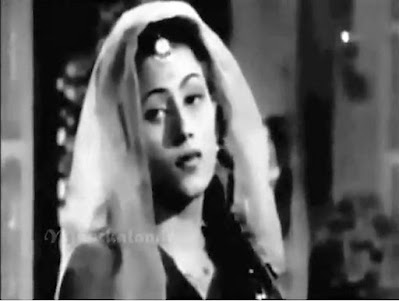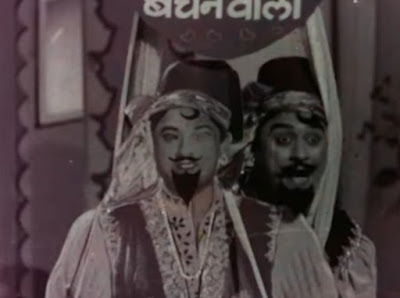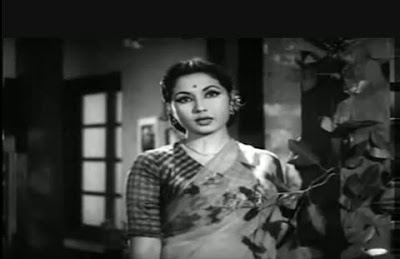 |
| 12.01.1918-05.01.1982 |
C Ramchandra. Or to give him his full name, Ramchandra Narhar Chitalkar was born on January 12th 1918 and died on January 5th 1982. It seemed apt then to do a post on the composer this month. Born in a small town named Puntambe in Maharashtra, Ramchandra was fascinated by films early on. In fact, he wanted to try his luck as an actor, and even acted as the hero in a film called Nagananda (1935). The film was never released. Bit roles in indifferent films followed, but the young lad never quite made it big.
 |
| CR with Bhagwan (Picture Credit: Film History Pics |
It
was here that he also became acquainted with actor Bhagwan, who gave him his
first break as an independent music director in a Tamil film that he was
directing – Jayakodi (1939). Then he signed Ramachandra for his next
film, also in Tamil, called Vanamohini (1941). By now, the two were
close friends, and when Bhagwan decided to make Sukhi Jeevan (1942) in
Hindi, it was taken for granted that ‘Ramchandra Chitalkar’ would score the
music for the film. While the film only did average business, the music was
appreciated, and Ramchandra had his foot in the door in the Hindi film industry
as well. Bhagwan and he would collaborate professionally on a further 15 films.
It was producer Jayant Desai who christened him ‘C Ramchandra’, a name under which he established himself in Hindi. His collaboration with Desai lasted for two years and five films. A falling out with Desai ended that partnership, but C Ramchandra (CR) continued to compose for Bhagwan’s productions. He also composed for a few stunt films under the pseudonym ‘Anna Saheb’ – a nickname bestowed upon him during his sojourn down south.
Success wasn’t too far behind – the young composer was fast making a name for himself for the wide variety of songs he was composing. He was also making a name as a singer of note - singing under the name 'Chitalkar'.
CR was insistent on the lyrics being written before he began composing, preferring to compose a melody according to the metre of the verses. He formed a lasting collaboration with several lyricists; in fact, it was one of them, Kavi Pradeep, who introduced him to S Mukherji, and the collaboration with Filmistan Studios would prove very lucrative for the ambitious composer.
Today, on what would be his 102nd birth anniversary, a collection of my (and my husband’s) favourite CR songs.
Tum kya jano tumhari yaad meinShin Shinaki Babla Boo (1952)
Singer: Lata Mangeshkar
Lyrics: PL Santoshi
CR was known for his decidedly westernised tunes, but this one from Shin Shinaki Babla Boo is a wistful, plaintive ballad penned by director-producer-lyricist, PL Santoshi. There’s a deep sadness that underlies Lata’s voice as it skims lightly and effortlessly over the notes. I don’t know if the picturisation would have done justice to this melody, but it touches a chord deep within me.
Parchhaiin (1952)
Singer: Lata Mangeshkar
Lyrics: Noor Lucknowi
Kitna haseen hai mausam
Azaad (1955)
Singers: Chitalkar, Lata Mangeshkar
Lyrics: Rajinder Krishan
The first two songs on this list have been my husband’s picks, but this was on my original list of ‘Favourite CR songs’ that I listed, let’s see, around 7 years ago. When I mentioned it to my husband who was helping me with the songs on this list, he grinned and said, Kitna haseen hai mausam, kitna haseen safar hai, Saathi hai khubsoorat, aur Meena Kumari hai. ‘nuff said. And so we finally agreed on one song.
Azaad fell into CR’s lap because Naushad was aghast at the producers’ temerity in wanting him to compose the songs within a month. CR agreed to the deadline, with one proviso – he would be paid a rupee more than what they were offering Naushad. Perhaps the challenge excited him. Perhaps he had a point to prove. Whatever be the reason, CR composed all 10 songs and had them recorded in a month. What’s more, when Talat, whom he had signed for this song had a scheduling conflict, CR stepped in, modulating his voice to sound exactly like Talat.
I love all the songs of Azaad, from Radha na bole na bole na bole re to Jaa ri jaa ri o kaari badariya to Aplam chaplam, but this lilting melody is one of my favourite songs.
Shehnai (1947)
Singers: Chitalkar, Lalita Deulkar, Amirbai Karnataki (Shamshad Begum, Meena Kapoor)
Lyrics: PL Santoshi
Another film that ‘accidentally’ fell into CR’s lap. The film was originally offered to Ghulam Haider, who was too busy then to take up the offer. So we got a soundtrack that was youthful, and straddled a variety of genres with ease. This song, as CR himself admitted, was inspired by a Goan folk song called Majhya ektyachi. Interestingly, while the record credits the song to Shamshad Begum, Meena Kapoor and Chitalkar, the film version credits Chitalkar, Lalita Deulkar and Amirbai Karnataki. Considering the period, the sounds are very contemporary. (In the 90s, there was an ad on Doordarshan that used this song to encourage people to eat more eggs.)
Taaron ke zubaan parNausherwan-e-Adil (1957)
Singers: Mohammed Rafi, Lata Mangeshkar
Lyrics: Parvez Shamsi
I’d initially heard Taaron ke zubaan par over the radio when I was a child. Then, many years later, I watched the song on Chhayaageet or Chitrahaar. (Truth to tell, I have completely forgotten the story of Nausherwan-e-adil.) Parvez Shamsi pens a quintessential love ballad with the lovers extolling the ambience, the stars, the moon and their love for each other. The song ends with a lovely piece of music that continues even as the voices fade away.
My husband’s choice. 'Why?' I asked him? 'Because I'm a naastik,' he said. I didn’t quibble too much since this was on my list as well. Moreover, it seems particularly apt for these times, as the world deals with the rise of authoritarianism and the forces of divisiveness. A seething critique of religion, Kavi Pradeep, who doubled as both lyricist and singer, poured his soul into the lyrics and the singing.
Another ghazal from CR (though a ghazal depends on the metre and has nothing to do with its music). I’ve always loved this song, and it is one of Lata’s great solos. The film was a sorry mess, with Madhubala playing Poonam, a village belle in love with a foreign-educated Dr Anand (Dev) but forced to marry a thrice-widowed man old enough to be her father instead. Strangely enough, the leading man (a very young Dev Anand) didn’t have a single song in the film.
Here’s the ‘typical’ CR song, a song that’s gained a cult status over the decades. Albela had a dozen songs, each one of them a staggering hit, as was the movie, including Shaam dhale khidki tale, Dheere se aaja re akhiyan mein, Bholi soorat dil ke khote, Qismet kihawa kabhi naram. By now, Bhagwan and CR had formed an unbeatable team, but Albela was their tour de force.
Shola jo bhadke is a lovely melody, one that really sets your foot tapping. Chitalkar sang the bulk of the songs (Rafi stepped in for a duet), and here, with Lata, there’s a joie de vivre that’s infectious. It is the quintessential picnic or party song.
Like for Azaad, CR came late to the table. Composer Basant Prakash (Khemchand Prakash’s younger brother, was the original composer, but ill-health forced him to leave the project midway. Then, Hemant Kumar took over, but for reasons unknown, he too stepped aside. But film lore also has it that the film had been offered to CR first, and because he couldn’t find the dates, it was offered to Basant Prakash. Ultimately, however, it was CR who composed the score, proving that daane daane pe likha hai khaane waale ka naam is perhaps not just an idiom. Anarkali was indeed a career-defining score.
A gender-reversal song of sorts with the girls teasing the boys, this Lata-Amirbai duet has become another cult favourite over the decades. It’s another infectious, foot-tapping number picturised on a pair of lady spies (Nalini Jaywant and Kuldip Kaur) in this film that focused on the activities of the Indian National Army during the British occupation of India.
CR
was definitely ‘inspired’ by the Latin-American beats of Edmundo Ros’s Chico-chico,
but I have to confess that I have (almost) always preferred the Indian composers’
arrangements in 'inspired' songs to that of the originals. (There's also a Carmen Miranda version of the song.)
Amardeep was a wreck of a film, and when Dev comes off as a thespian compared to the heroines, you can guess how bad it was. The heroines outdid each other in the hamming stakes. When I add that Dev lost his memory, not once but twice, each time forgetting one of the two women he loves (not the same one each time), perhaps you can understand what I'm getting at. But, Dev is just eye candy – the film belongs to its two heroines.
CR gamely soldiered on, though I doubt the film inspired him. But this Lata solo has always been a favourite.
PL Santoshi wore a number of hats and delighted in telling convoluted stories – the more the members of cast, the merrier. While the film was nothing to write home about, and Rehana is by no means a great actress, Raj Kapoor was delightful in a film that had the potential to be a comedy of errors (but faltered along the way).
But CR composed a lovely bouquet of songs for the film, and though Barsaat, coming the year before had established Mukesh as Raj Kapoor’s ‘voice’, Chitalkar playbacked for him in this lovely duet with Lata Mangeshkar. If I were to ever post a list of my favourite Lata-Chitalkar duets, this song would be somewhere on the top of the list.
Eena meena deekaCR was past master at making successful albums, not just hit songs. Like Albela, Anarkali, Sagaai, Sargam, etc., Navrang, too, had a score that was absolutely inspired, including Aadha hai chandramaraat aadhi, Arre ja re hat natkhat, Kaari kaari andhiyaari thi raat, Shyamal shyamal baran and Ye maati sabhi ki kahani kahegi. And above all, this song – Tu chhupii hai kahaan – which I like as much for its melody with its long stretches of instrumentation, as for the picturisation, with its fabulously imaginative sets. (Everything except Sandhya and her costume/make-up.) But apart from all that, it’s Bharat Vyas’s lyrics – its plaintive search for a lost love, the desperation of a man who’s lost his muse, and with a burst of sheer joy when the lover returns, that makes it extra special. This is one of Manna Dey’s finest duets, and Asha matches both his vocal skill as well as the song's emotional beats – it’s a song that strikes a chord deep within me, and will always be there nestling along the top few songs among the hundred or so that constitute my eternal favourites.
One of the handful of Lata-Asha duets, I’ve always had a soft spot for this song. My husband promptly seconded my choice – it’s picturised on Meena Kumari (and Shyama, but that’s besides the point). While the moon as a messenger is a common enough trope in old-fashioned love stories, lyricist Rajinder Krishan spun magic for both heroines – one maiden is exhorting the moon to stay with her beloved, illuminating his path; the other, is simply pining away for him, and wants the moon to tell him how much she misses him. Love has many different shades.
And finally, as a bonus, a song that has made CR’s a household name in Tamil Nadu – it’s as much a triumph of melody as it is one of the best 'dance-off' sequences in Indian films, a competition between Padmini and Vyjanthimala. The film, Vanjikkottai Valiban was remade in Hindi as Raj Tilak, with the actors reprising their roles, and CR composing the music for the Hindi version as well.
Which of C Ramchandra's compositions would you pick? Tell me in the comments below.


















No comments:
Post a Comment